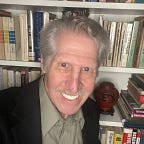A PARABLE OF LIBERTY LOST AND FOUND — Part 2 of 10: Democracy
By the third generation on the island, the enlightenment of the first settlers has dwindled in their offspring. The spiritual tools for mindfulness and self-rule are still taught to every child, yet youngsters are distracted by all the adventures of living in a growing community on a big island. Parents can only teach their children well.
The social mandate for conscious self-government fades in every successive generation. Initiation into spiritual sensitivity becomes a ritual with less and less substance. People are aware of universal oneness in their heads more than in their hearts or in their guts and souls.
With less spirituality guiding daily life, human frailties and vices inevitably surface. Jealousy, envy and acrimony disrupt social harmony. Some branches of the Shakti and Kodesh family, for instance, resent how great-great-grandson Zack has prospered more than others in the clan.
The community soon faces cases of cheating, theft, rape, and even murder. For safety, women cede power to stronger men. Men compete for the most desirable and fertile women. Men begin to feel ownership of the women they win. Distrust between the genders grows. Added to the rising crime rate, the social fabric unravels at the edges.
Fed up with irresponsibility by heedless individuals, to protect themselves from a growing lack of self-control, the community agrees on rules of acceptable conduct. These at first carry the muted titles of “Guidelines.” As more offenses occur, “Regulations” follow. These eventually give way to “Laws.”
Initially, the rules are enforced mainly by social disdain — the old cold shoulder. In extreme cases, such as homicide, the killer is banished. Offenders must go off alone to a secluded part of the island to reflect on what caused their misconduct. Such people live apart until they sincerely repent and return redeemed. The full community then welcomes offenders home for a fresh start. Nobody clings to grudges or seeks revenge. Their past is not held against them. Doors open to show forgiveness and faith. Knowing they are loved and accepted helps them feel safe enough to make lasting changes in their lives.
Over time, all the ad-hoc rules grow too confusing. The people as a community decide they must establish a formal government to regulate their society. They write an official social contract, which some call a “charter” and most call a “constitution.” The document spells out the people’s natural rights, liberties and duties in society.
To settle on the terms of their constitution, all the adults and mature youths gather under the spreading Unity Tree. Whenever a consensus can’t be reached on a given articles of the constitution, the community votes. All votes are equal, men and women alike, one vote per person for each issue.
The wise islanders consider the future as they compose their social contract. They agree that in years ahead, whenever the community wants to add or change any law, the constitution can be changed or amended by a consensus or a vote at open meetings under the sacred tree. They seek to provide a means for sensible governance in changing times.
The people agree to create a limited small government to enforce and administer the laws passed by the assembled community. The first duty of government is balancing safety and liberty for all the people. A second duty is coordinating the combined efforts of the entire community, like building a road or canal or a place for the healers to work.
Every law enacted under the tree must be enforced impartially without any regard to such factors as race, creed, status, or gender. In the case of crimes, the accused are presumed innocent until found guilty by a jury of their peers, but only after a fair and honest deliberation of all the available evidence. Judges must apply existing laws; they may not create new laws on their own. The right to create laws resides with the people alone, acting together as a whole community with conscious consent.
Based on the self-evident truth of their natural connectivity and equality in the whole of life, the people establish for themselves and their posterity a direct democracy. Other names used to describe this form of government include genuine democracy, true democracy, pure democracy, open democracy, and real democracy.
In this way, the rule of law replaces personal sovereignty. Because they lack the spirituality to govern themselves on their own, the people agree to rely on government to balance freedom and responsibility for them. Their genuine democracy lasts as long as most people behave themselves.
< Previous | Next >
Excerpt from the expanded preamble for
MAKING GLOBAL SENSE
Grounded hope for the 21st century
inspired by Thomas Paine’s Common Sense.
(http://globalsense.com)
Please follow Judah Freed on Medium and like the book page on Facebook.
This is a work of fiction. Names, characters, businesses, places, events, locales, and incidents are either the products of the author’s imagination or used in a fictitious manner. Any resemblance to actual persons, living or dead, or actual events or places is entirely coincidental or is intended purely as an allegorical satire, parody or spoof of such person, event or place, and is not intended to communicate any true or factual information about that person, event or place. This disclaimer applies to the entire series in the story.
